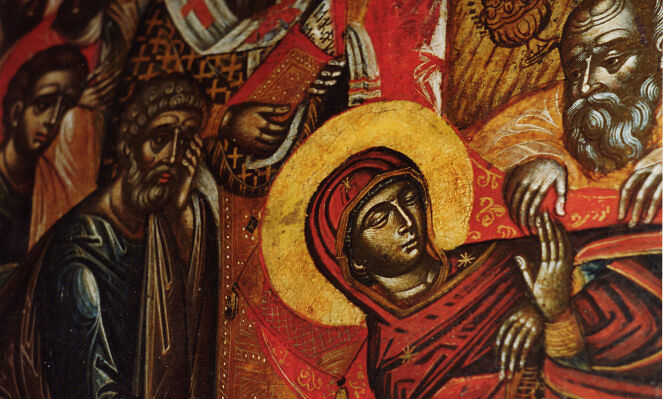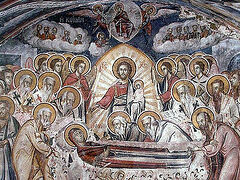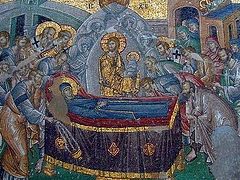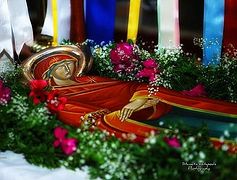In the name of the Father, and of the Son, and of the Holy Spirit.
Our friends!
“Let us hymn the divine burial of the Mother of God.”
It was a great event that gave birth to this present feast. “Heaven rejoices now with earth, glorifying the repose of the Mother of God.” And as the world venerates the Life-Bearing Tomb of the Son of God and the Son of the Virgin—the source of our resurrection—so it falls down before the tomb of the Mother of God. “Gethsemane, receiving the blessed and virginal tomb, is honored as a royal palace.” And to this day, people from all over the world flock there, to her tomb. They offer her prayers of thanksgiving and joy, supplications in sorrows, woes, and illnesses; they offer the love of their hearts and their boundless trust in her motherly love and care.
And every Orthodox church has an icon of the Dormition of the Mother of God or a representation of her burial shroud placed in the center now. And everywhere throughout the whole world, the Heavenly Queen hears our prayers and sees our pious veneration of the feat of her life and the glory that crowned her life. And her tomb, a source of tears, was turned into a source of joy, and death became the Dormition. We hear the voice of the Mother of God addressed to us in the Church’s hymns today: “Children of the Lord and my Son! Let not the joy of my departure to God be turned into weeping. Rejoice! I am with you always until the end of the ages.”
From this glorious day of her Dormition, the light-bearing Virgin becomes the Mother of all of mankind and the Queen of Heaven. And her motherly care clearly opens up to man. The earthly life of the Virgin Mary was hidden in humility, silence, and mystery. It was only from the grave that the light of her glory and the greatness of her life shone upon the world. By her birth and death she revealed that she belongs to human nature. But how many people knew during the life of the Most Holy Virgin that her conception was seedless, her birth-giving was incorrupt, and her death was deathless? Death and the grave couldn’t hold her who gave birth to the Destroyer of death; and after three days, her tomb was found empty, proclaiming to the world the great mystery of Mary’s life, of the immortality of her soul and body.
And this testimony lives in the world from generation to generation and goes beyond the limits of life, when one meets on the threshold of eternity his fervent Intercessor—the Mother of God, who is ready to help the soul departing from the earth. And many saints and righteous people have left us truthful testimonies about how the Mother of God appeared to them in the days before their deaths, encouraging them with the bright hope of her aid. The Most Pure Virgin herself gave death a tribute of the human race, but only for a brief moment. Her Son and God received her soul into His hands, and her body, lifted up upon a cherubic chariot, illuminated by grace, ascended to Heaven. And it’s from this day that the Mother of God—the Queen of Heaven—standing at the right hand of God the King, is seated high above every created being.
In awe before the majesty of the Mother of God, St. John of Damascus says that our minds can’t imagine the radiance enveloping the Blessed Virgin in Paradise. She, the Queen of Heaven, is venerated by all the ranks of angels; she is glorified by the Tri-Hypostatic Godhead itself: the Holy Spirit—as the Unwedded Bride; the Son and Word—as the unwedded Mother; God the Father—as the beloved maiden.
From the day of the Dormition, the prophecy of the Psalmist and King David about the future Queen received its end: On Thy right hand stands the Queen, clothed in vesture wrought with gold… (Ps. 44:9).
“From today the ineffable joy and immeasurable honor of Mary is with her Son Jesus and reigns in Heaven and on earth,” the holy Church says, echoing the forefather and prophet. The greatness of the Mother of the Lord was revealed to the earthly and Heavenly worlds by her Dormition, and the Church was filled with hymns to her who is more honorable than the Cherubim and more glorious beyond compare than the Seraphim.
But the first devout prayers to the Most Holy Virgin were brought to earth by the inhabitants of Heaven already during her lifetime. The Archangel Gabriel brought her a prayer of joy and annunciation: “O Theotokos and Virgin, rejoice Mary full of grace…” The angels of God have taught us the Heavenly glorification of the Heavenly Queen: “It is truly meet to bless thee, O Theotokos…”
The prophecy of future veneration was uttered by the Most Pure Virgin herself when her life was still mystically hidden from men. Unwittingly revealing the secret of her chosenness before the righteous Elizabeth, she says: From henceforth all generations shall call me blessed (Lk. 1:48).
The first century of Christianity hasn’t preserved direct evidence of the glorification of the Virgin Mary. There are few mentions of her in the Holy Gospel. Our Lord Jesus Christ and His Apostles were silent about her, and this shows the mysterious dispensation of the providence of God, granting the veneration of the Most Holy Virgin to the free inspiration of faith and love. Love for the Mother of God in the Christian heart is born with undoubted evidence and irresistible force and is vividly confirmed by life itself and according to the measure of our life in the Church.
In the Church, having established ourselves in the vital saving power of the Savior’s feat upon the Cross, we see the most perfect holiness of the one who became the cause of our salvation, having united God with man. And we bow down and fall silent before the majesty of the abundant beauty of man revealed in her. In the Most Holy Virgin we see how faith in God and devotion to Him united the will of man with the will of God. St. Philaret, the Metropolitan of Moscow, said: “In the days of the creation of the world, when God uttered His living and powerful: Let there be…, the Word of the Creator brought creatures into the world, but on the unprecedented day when the divine Mary uttered her meek and obedient, Be it unto me…, the word of the creature brings the Creator into the world.”
And the sinlessness of the Virgin Mary, her most perfect holiness even in her earthly sojourn, were the cause of her chosenness, exceptional in strength and unique in the depth of sanctification.
Having become the Mother of God, the Holy Virgin received great rights of motherhood, and she gave these rights to mankind, adopted to her by her Son on the Cross, becoming its intercessor and patroness. Do we not see the realization of the general order of salvation established by God for mankind in the life of the Most Holy Theotokos? The Most Holy Virgin traversed the path of earthly life from natural birth to death, growing by humility, obedience, the cross of motherhood, and complete devotion to the will of God unto perfect holiness. St. Ephraim the Syrian, comparing the holiness of the Mother of God with the greatness of the holiness of the Savior, writes: “Thou, O Lord, just like Thy Mother, are perfectly holy, for Thou hast no blemish, O Lord, and Thy Mother hast no sin.”
And she—the greatest of the saints—has sanctified human life, leaving her children an example of life lived unto salvation. Willingly submitting to the law of death that is common to mankind, the Theotokos rose to the last step of her ascension to Heavenly glory. And her Dormition became a transition into the realm of eternal existence. “The life of the future age, which we still await, is already a present eternal life for her, at the highest degree of glory.” The ascension of the resurrected Mother of God is confessed as an undoubted belief of the Orthodox Church. “Beholding the Dormition of the Most Pure One, the angels were amazed, for the Virgin ascends from earth to Heaven.”
And due to her nearness to God, the Theotokos possesses incomparably great power, which is promised to those who believe in her Son. Through the Mother of God our gracious union with Christ, with the Body of Christ in Holy Communion is realized. As Eve became the mother of all those who live by natural origin, so the Virgin Mary became the mother of all who live by grace. Through her Son, she adopts those who believe in her Son. Those who don’t confess her Son are deprived of her blessed sonship.
Standing before the throne of God, she intercedes for us, bestowing grace that quickens the power of our souls. The Mother of God’s significance in our salvation is so great and powerful that we turn to her not only as to an aid in our salvation, but as to the one who accomplishes our salvation. We pray: “Most Holy Theotokos, save us!” This faith of ours has become experiential knowledge of receiving her merciful help in a spirit of love and compassion for us, who are weak and sinful. And the troparion for today’s feast testifies that our life within the bounds of the Church of Christ passes under the protection of the Heavenly Queen in unity with God: “In falling asleep thou didst not forsake the world, O Theotokos. Thou wast translated to life, O Mother of Life, and by thy prayers, thou dost deliver our souls from death.”
What veneration and thanksgiving and what power of love must we offer to her in our hearts—to the initiator of our salvation, the intercessor for our salvation, our helper on the path to salvation.
And if Christ said that He is the Way, the Truth, and the Life, then the Mother of God, the daughter of man, unwaveringly followed her Son on this path to eternal life, leaving us an undoubted assurance of its salvific character, giving us an inspiration and source of strength to complete it, and with the joy of unity with God and the Mother of God.
Thus, my dear ones, let these two salvific names—Jesus Christ and the Theotokos Mary—ever be inscribed upon the tablets of our hearts; let them be the beginning and end of our prayers.
And the Most Holy Virgin, the Queen of Heaven and our Mother will never put our prayers to shame, for the sea of her grace-filled gifts is inexhaustible, the fount of her love is unquenchable, and her mercy knows no bounds.
O, gracious and all-glorious Queen! From your Divine radiance, send down upon us, your children who reverently fall down before your tomb, a ray of the light of your glory, and may it sanctify our minds darkened by passions, may it strengthen our weakened will, may it grant us the sight of your divine statutes, that we might zealously follow your example unto salvation. We await from you Most Holy Virgin, the joy and consolation of Christians, and your help and intercession.
Amen.




